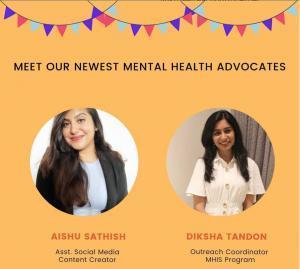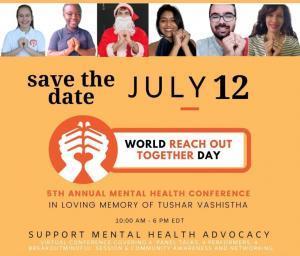(MENAFN- EIN Presswire)

Reach Out Together Founder, CEO & bestselling author, Aanchal Vashistha

Reach Out Together recruits mental health ambassadors from across the world.

This year's eight-hour event marks the fifth annual World Reach Out Together Day.
Professionals from Costa Rica to London, England share their journeys of recovery and thoughts on what that takes.
TORONTO, ONTARIO, CANADA, May 31, 2021 / / -- Neuroplasticity. Neurodiversity. These two concepts of mental health and how to approach it both treat mental health as an ongoing evolutionary process, rather than a static ''thing'' to be protected. For Toronto-based not-for-profit Reach Out Together Foundation, an ongoing dialogue to break stigma is part of that personal and social evolution.
A Functional Trauma Therapist in Uvita, Costa Rica, Cassandra Hope's health advocacy draws from both personal and professional experience.
Speaking with Aanchal Vash in Toronto-based not-for-profit Reach Out Together Foundation's weekly Mental Health Impact Series, she describes an unhealthy lifestyle she had while bartending full-time in her 20s, and how she knew she needed something to ground her.
At first, that was bodybuilding and competitive fitness. However, constant comparison to others developed into body dysmorphia and related chronic health issues.
A turning point for Hope was attending the Canadian School of Natural Nutrition. Drawing from this experience and new knowledge as a Registered Holistic Nutritionist, she and a partner established the IBS Academy, a platform dedicated to helping those living with chronic IBS and depression.
Noticing a high relapse rate, she turned to research on autonomic nervous system dysregulation, or in simple terms, ''how the brain rewires itself in the wake of trauma and abuse.''
She describes trauma as ''anything that is too much, too fast, too soon,'' evoking the gut-brain connection and what unhealthy eating habits can do to our state of mind.
Following trauma, the pre-frontal cortex triggering a fight-or-flight response to anything triggering traumatic memories is one aspect of ''neuroplasticity.''
''The brain is plastic. We can reroute neural pathways…if we''re shown how,'' says Hope. While our brains rewire after trauma in ways meant to help us adapt, that rewired brain can then continue to be rewired to ensure healthy long-term adaptation.
Overcoming the stigma from our networks and moving past the internalized stigma of shame is crucial for helping our brains to adapt, Hope says.
''Shame is unfortunately a pathological response. When we are in shame and when we have societal noise that is telling us [to be ashamed]…coming forward and asking for help is a very vulnerable thing.''
Asking for help is difficult, she says, when we aren''t taught how to go about it, or that there are changeable neurological patterns, not personal moral failings, behind unhealthy responses to trauma.
Her advice for those working through trauma is, ''Recovery is possible. It's science! It's not whether you''re worthy or not.''
For Kate Vrastak, a Cornwall, Ontario-based Social Service Worker who coaches clients in trauma recovery, both lived and professional experience show this to be true.
''Our mindset controls our behaviour,'' she says.
At 13 years old, Vrastak suddenly lost her family.
''I was only 13 when I became an orphan, and I decided that my life did not stop. It only began,'' she says.
''I could''ve easily given up, but I chose to say ''No, my life is worth it and there's a reason why I''m still here,'' and I want to give hope to others out there.''
Similar to Hope's focus on changing neural pathways to alter our habitual response to triggers of trauma, Vrastak says our subconscious inner dialogue, or ''neurolinguistic programming'', plays a crucial role. Being able to mentally revisit events from our impressionable early years to let go of lingering raw emotions and ''limiting beliefs'', she explains, is a key part of recovery.
Limiting beliefs are feelings that hold us back, such as fear, shame, or guilt. Vrastak says our inner dialogue can contribute to them, but so can our environment and our network. There's a role, she says, for community support through foundations such as Reach Out Together Foundation.
Her advice for organizations and anyone supporting a person in their life through trauma? ''Show love, validate and listen. Don''t be judgmental.''
Garth Peters, a Mental Fitness Coach living in the U.K., speaks briefly about limiting beliefs. To him, they''re a ''challenge'' to be overcome in our journeys of recovery.
Peters's limiting beliefs came in the wake of a brutal attack that left his jaw detached, and the details of which he knows not from memory but from journaling a meeting with a detective after the fact. His then-partner, Lisa, who had been living with a mental illness also passed away to suicide following the attack.
Yet a year later he''d become a Mental Fitness Coach, sharing his message of resilience, faith, acceptance and self-care to help others rebuild from trauma and lost confidence.
''The most powerful thing that helped me shift was acceptance,'' he says.
Peters says we each control our own responses to events, but he credits a range of support for their role in his recovery. His family's knowledge of nutrition, the professionals who encouraged him to pursue counselling training, and a friend in a coffee shop who shared his own story with Peters each played their part in encouraging him to open up and to take steps for his well-being.
''Mindset is key for me,'' Peters says, adding his mindset is reflected in his ability to help others.
''I realized how good it felt when I did things the right way...I realized I wanted to help other people.''
For each of these professionals, mental health is a matter of practice and continual work. Each has a unique personal journey, but all overlap in a pursuit of motivation, breaking stigma, and collective mental health.
Reach Out Together Foundation's aim, says founder Aanchal Vash, is to continue telling these stories, promoting mental well-being ''community by community, conversation by conversation.''
For this, there are many more stories to be told.
Reach Out Together Foundation's work continues with an eight-hour event planned for July 12, World Reach Out Together Day. In memory of founder Aanchal Vash's brother Tushar, the day will include four panel discussions involving professionals speaking on a range of mental health topics. Tickets are now available on
Brad Northcote
Reach Out Together Foundation
6474642134

MENAFN31052021003118003196ID1102185440